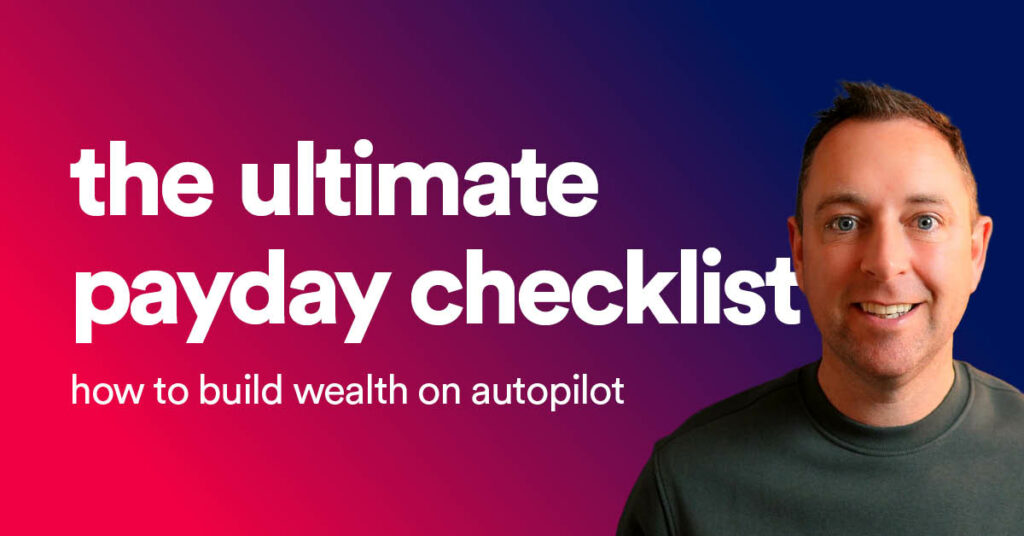It’s the last Friday of the month and for a lot of us in employment, it’s payday. Often payday is a time to enjoy the spoils of your hard-earned wages.
Now I haven’t had a wage in almost a year. But I generally know it’s around payday when I see an influx of Amazon and DHL vans pulling into my street almost in convoy. It’s normal for most people to want to spend their wages. And I totally get that. You spend 40 hours a week, often more, putting food on the table, and heat in your homes. Hopefully, there’s some money left over to spend on the things you want, not need.
But without a plan for our money, I promise you’ll get to the end of next month and wonder where your money went. And often there’s nothing put away for your retirement, let alone early retirement.
And don’t worry, I won’t sit here on my moral high horse telling you to save every penny. As long as you’re making positive steps forward, that’s all you need to do. But if you want to build wealth and one day retire securely in the knowledge that you have enough, then my ultimate payday checklist is for you. So let’s get into it.
My ultimate payday checklist
Check your payslip and make sure it’s correct
For the 13 years, I was an employer, I managed the payroll for my team. I promise that even with double and triple checking the information needed to process payroll for a medium-sized team, mistakes sometimes crept in.
I always advised my team to double-check their payslips and I welcomed anyone questioning their wages. It’s always better to be 100% clear on any additions or dedications you might have and to understand why these might be applicable.
The sooner you address any issues with your salary, the quicker they can be resolved and any money owed deposited to your account.
Pay yourself first – transfer money to your saving, investments or towards debt
If you treat saving and investing like a bill, it must be paid. On time and in full. By paying yourself first, you are putting your money to work for you in a way that best suits your situation.
If you can set up automatic payments into your savings or investment accounts right after you get paid, then this puts that money beyond your ability to spend right away.
Paying yourself first is one of the most common habits I hear when I speak to personal financial coaching clients who are on their way to achieving financial freedom. It is not a get-rich-quick plan, but a get-rich one day. By automatically putting money into your investments on a regular basis you also benefit from pound cost averaging, which is one of the most efficient ways to invest over the long term.
For those paying down debt, use the Avalanche Method of debt repayment which means you start with the highest interest rate first and pay it down, then move on to the next debt until none remains. Or if you are paying down debt using the snowball method, you pay off the debt with the smallest balance first, regardless of the interest rate being charged on the debt.
Put money into your emergency fund
Before anything else, funding your emergency reserves is the most important task you face on the path to achieving any level of wealth. An actual emergency situation can put you into debt, or into further debt and this is a very real worst-case scenario.
Create an emergency fund with 3-6 months of essential spending saved in a high-interest, instantly available savings account. It’s important to put this somewhere out of reach. This is an emergency fund, not an “I feel like a holiday” fund.
If you are in the process of paying down debt, there is an argument for and against paying down the debt versus building an emergency fund. In my opinion, doing anything is the correct move. As long as you are doing something you are moving forward and that’s what really matters.
Put money towards any sinking funds you have
A sinking fund is a savings pot or savings account that is earmarked for a near-term goal generally in the next 5 years. Common sinking funds my clients have would be:
- Deposits for a first or new home
- Saving towards a wedding
- Money to buy their next car outright when their current finance deal is up
Generally speaking, your sinking funds are best kept in cash versus investing this money. Over the long term we do expect our investments to perform better than saving, but with swings up and down in the market expected, if you want to ensure you achieve your expected returns, investing the money may not work in your favour.
Personally, I invested everything including the money I was putting into my sinking funds. I was happy to bear the risk. It really does come down to personal preference and your appetite for risk in funds that you will need in the next few years.
Review last month’s budget
Whether you stuck to your budget last month or not, knowing as early as possible is critical. If you need to, adjust this month’s budget to make up for any overspending. Unfortunately, that does mean you’ll have less to spend, but look, let’s be frank, you knew you overspent, didn’t you? Things happen and that’s fine, as long as you take action to rectify them now and not leave them to mount up.
If you have any unspent money from this month’s budget, you can and should put this money towards your debt, savings or investments. Whatever goal you’re working towards is absolutely fine. And great work. Sticking to your budget is one thing. But if you can come in under budget and still have a great quality of life, that’s amazing.
Remember the greater your saving rate each month, the quicker you’ll be able to retire
Set this month’s budget
A budget is always forward-looking at how you will spend your money. According to research, you are 42% more likely to achieve your goals if you write them down. And while your budget might not be committed to paper but rather a spreadsheet, the act of planning this in advance and preparing your budget for your planned expenses will set you up for success.
And if you don’t already create a budget. Well, I don’t think we can be friends anymore, because unless you are already financially independent, everyone can benefit from effectively managing their finances.
Check all recurring payments
As part of your budget planning, now is as good a time as any to review your subscriptions and recurring payments. It’s all too easy to let such costs run wild and I have spoken with people who have hundreds of pounds of subscriptions a month, with many of them being unused or forgotten. Once you’ve audited these costs make sure to set up direct debits to avoid late charges.
Avoid splurging this weekend
I get it. You’ve worked hard to earn this money and you are of course entitled to spend it how you want. But don’t let all that hard work go to waste by spending your income without any consideration for your future.
Consider using a 50/30/20 budget to give you the structure to save and invest, but the flexibility to enjoy your money also.
- 50% of your income on expenses
- 30% of your income on discretionary spending
- 20% of your income towards your saving and investing
Every payday is a new opportunity to start your financial journey or to move yourself further on the path towards your financial goals. By putting just a little effort in each month, you’ll be secure in the knowledge that your future wealth can and will be achieved slowly and surely.
Don’t forget to check out the foundered money YouTube channel where I share all of my content in video format.


